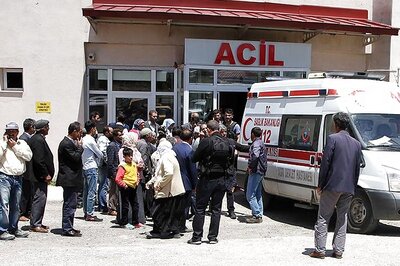
views
Arabica coffee beans of Bababudan Giri ranges are known for their tantalising aroma. It is believed that Sufi saint Baba Budan brought the first seeds from Arabia and planted them on the hills of Chikmagalur district.
Unfortunately, the Arabica coffee may be facing a threat of being a non-entity for cultivation in Malnad districts like Kodagu, Hassan and Chikmagalur in a matter of another 10 years following nature’s vagaries and pest menace.
World coffee production for 2012 is expected to be 148 million bags. The highest production of 50.4 million bags is expected from the world’s largest coffee-producing country Brazil.
During 2011-12, Brazil produced 33 per cent of the world’s coffee, followed by Vietnam (15.2%), Indonesia (6.3%) and Columbia (5.9%). India slipped to 7th position from 5th, with a share of mere 4 per cent.
At the domestic level too, coffee production has dropped considerably. The Coffee Board mentioned in its Post-blossom estimate for 2012-13 that highest yield of 3,25,300 tonnes comprises 1,04,000 tonnes of Arabica and 2,21,300 tonnes of Robusta.India exported 3,45,000 tonnes of coffee worth `4,851.52 crore at unit price of `140.45 /kg, during 2011. Export during 2012 has dipped with Arabica recording 38,563 tonnes, Arabica Cherry registering 11, 063 tons while major export share goes to Robusta with a total of 1,38.461 tonnes.
Karnataka Planters Assocation Chairman Nishant R Gurjer told Express: “Reasons for the slump in production are high cost and shortage of labour, decline in productivity, rise in the cost of fertilisers and inputs, unserviceable debts, water and power problem.”
Arabica coffee grown in the shaded valleys might be completely washed out in another 10 years, because of no permanent solution to White Stem Borer disease. “Growers are shifting to Robusta cultivation,” he said.
Gurjer said if the Ministry of Commerce accepts the standing committee recommendations, there is a ray of hope in this regard.




















Comments
0 comment